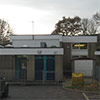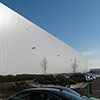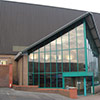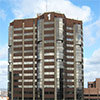Legionella Risk Assesment: Offices, Hotels, Factories, Schools
Legionnaires' disease - health and safety in the workplace
Offices

There are many variations of offices, from small units with 1 or 2 people to very large 20+ storeys with several hundred staff. Equally the water systems within are commensurate with the size; however the complexity varies a lot. Some refurbished Victorian buildings contain multiple loft spaces containing stored cold water tanks and numerous water heaters with very difficult and time consuming access. More modern purpose built offices usually have better designed water systems with plantrooms containing cold water storage tanks and hot water vessels.
Schools

As with offices there is great variation in design, layout, complexity and size of both buildings and water systems within. The risk to the children is statistically very low (see Myth 3) but of course there are adult staff, parents, visitors and contractors on the premises. Often there are unused showers where stagnation of water in pipes becomes an issue.
Universities

A campus typically has many buildings from say 50 - 350 comprising offices, teaching areas, laboratories, student accommodation, recreational facilities, bars, nightclubs, sporting venues, community buildings, even museums, etc. A comprehensive management plan is required to minimise the risk from legionella, particularly during holidays when water usage drops and warmer weather can increase bacterial numbers.
Factories

These are probably the most complex in terms of water systems that are used in manufacturing, production, processes, maintenance, quality control etc. It is the usual place to find water cooling towers that are a high risk system with regard to legionella. Cooling towers cause the largest outbreaks when control measures are inadequate. There are about 14,000 registered cooling towers in the UK, some are probably much closer to where you live or work than you realise.
Light industrial units

Many types of companies are found in these units but as with all work places they will have water for kitchen and toilet facilities. This means a risk assessment for legionella is required by law as it is for any workplace. On the plus side it is normal that relatively little follow up work is needed but of course it depends on individual cases.
Hotels

Historically these are the site of larger outbreaks of Legionnaire’s disease and the original one in the Bell Vue Stratford (now called the Regency Hyatt) in Philadelphia, America. With numerous rooms, many people, stored water, many droplet forming systems and consequent exposure they have several risk factors to contend with. However a professional risk management plan, effective control measures and monitoring can be deployed to minimise the risk for the benefit of staff and guests.
Other types of sites

There are many workplaces which cannot all be covered here but the principles are the same for them all. Archer & Stone personnel have experience on numerous sites including Fire Stations, council buildings, military bases, hospitals, prisons, social housing, charity sector buildings and sporting stadia. Wherever you work, whatever type of site you are on then Archer & Stone can help.
